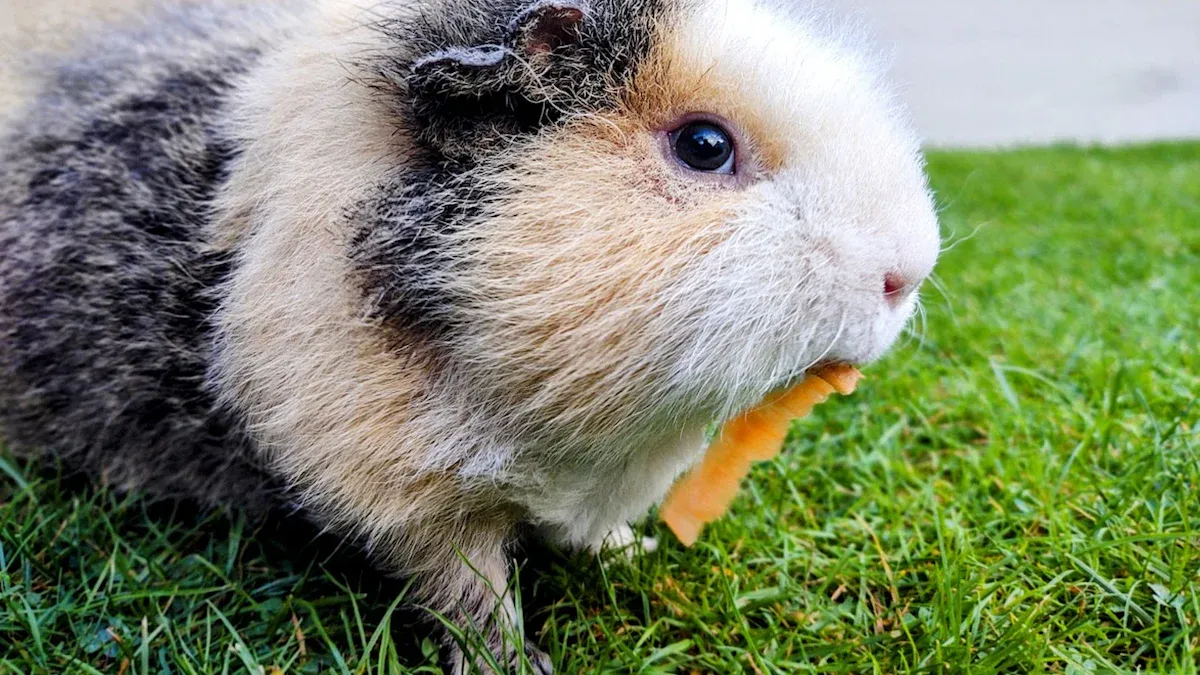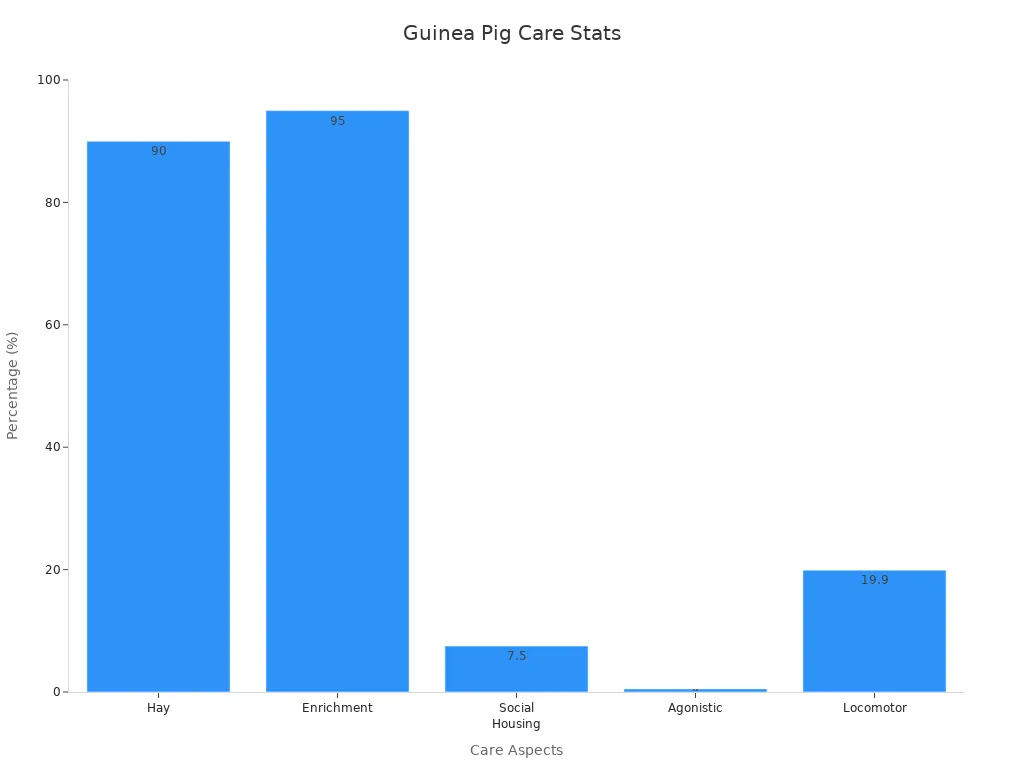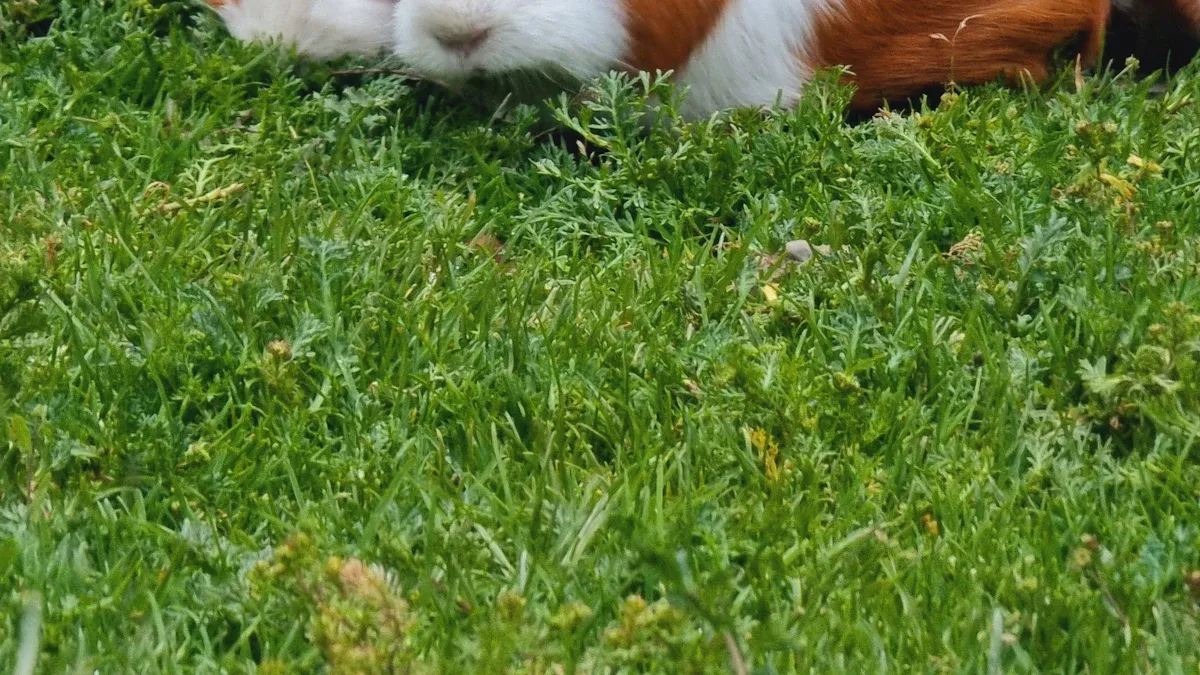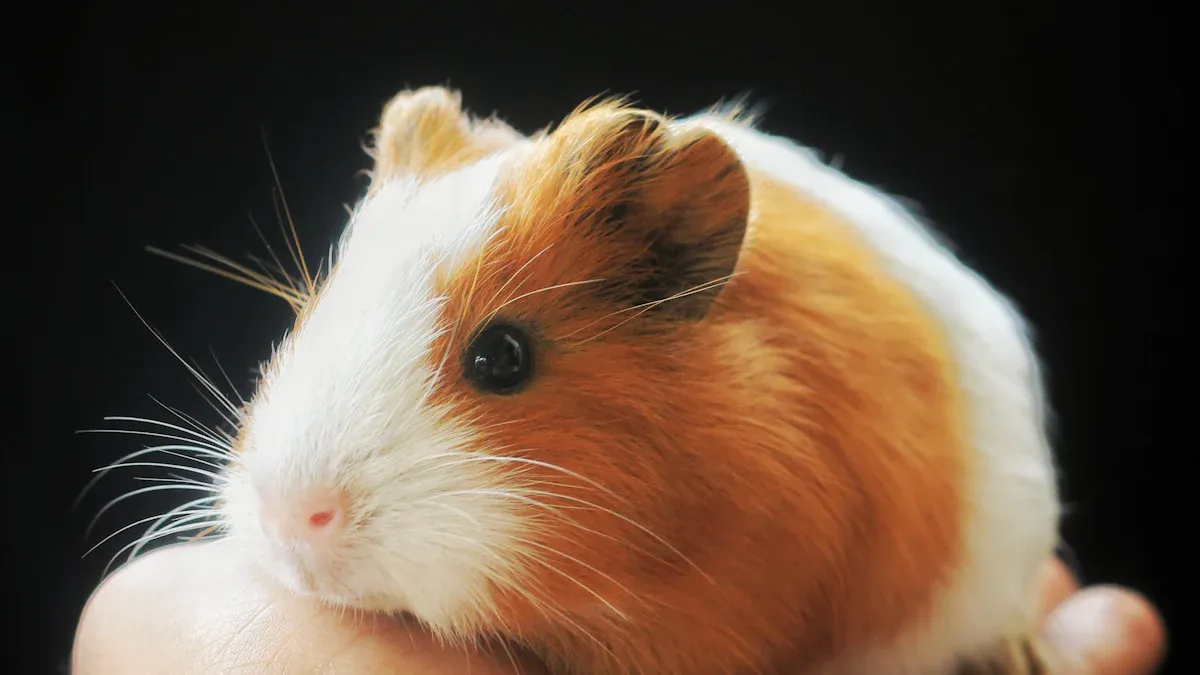
Welcome to the world of guinea pig care! You’ll want to focus on a few basics: offer fresh hay and veggies, keep their cage roomy and clean, give them daily attention, and handle them gently. Building trust takes time—weeks or even months. Check out this chart for some key care stats:

Did you know? Most owners spend at least 15 minutes daily cleaning and 10 minutes preparing food. Guinea pigs can live up to 8 years, so your patience and routine truly matter!
Key Takeaways
- Provide your guinea pig with fresh hay, clean water, and vitamin C-rich veggies every day to keep them healthy and happy.
- Set up a spacious, clean cage with soft bedding and hiding spots to create a safe and comfortable home.
- Spend time handling and socializing gently each day to build trust and keep your guinea pig active and stress-free.
Getting a Guinea Pig
Choosing Healthy Pets
Picking out your new furry friend is exciting! You want a pet that looks alert and curious. Healthy guinea pigs have bright eyes, clean noses, and smooth fur. Their teeth should look even, and they should move around easily. When you visit a shelter or store, check that the cage is clean and roomy. Avoid cages with wire or mesh floors, since these can hurt little paws. Look for bedding made from aspen or paper, not pine or cedar, which can cause breathing problems.
Here’s a quick checklist for choosing a healthy pet:
- No signs of illness or injury
- Clean, comfortable living space
- Hiding spots like boxes or igloos
- Fresh veggies with vitamin C in their diet
- Chew toys for healthy teeth
- Regular grooming and nail trims
Tip: Find a vet who knows about guinea pigs before you bring one home. Exotic animal vets can help keep your pet healthy.
First Days at Home
The first days in a new home can feel scary for a guinea pig. You can help them settle in by following these steps:
- Let your pet rest and explore without picking them up right away.
- Talk softly so they get used to your voice.
- Offer fresh hay, pellets, and veggies with vitamin C.
- Keep the room quiet and avoid sudden movements.
- Give them a safe hiding spot to help them feel secure.
- Stick to a daily routine for feeding and cleaning.
- After a few days, start gentle social time in a familiar area.
If you want your guinea pig to feel less lonely, consider adopting a pair. They love company!
Guinea Pig Habitat

Cage Size & Setup
Your guinea pig needs a home that gives them plenty of space to move, play, and relax. A small cage can make your pet feel stressed and unhappy. Experts recommend a cage that is at least 2 feet by 3 feet for one guinea pig. If you have two, you should aim for at least 10.5 square feet. Bigger is always better!
Here’s a quick look at recommended cage sizes and their benefits:
| Number of Guinea Pigs | Minimum Cage Size | Why It Matters |
|---|---|---|
| 1 | 7.5 sq ft | Enough room to move and explore |
| 2 (males) | 10.5 sq ft | Reduces fighting and stress |
| 2+ (with divider) | 15 sq ft | Allows social time and separation if needed |
A cage with a solid floor keeps your guinea pig’s feet safe. Avoid wire bottoms because they can cause injuries. Make sure the sides are not too high—guinea pigs do not climb, and they can fall if the cage is too tall. Good airflow is important, so stay away from glass tanks or plastic tubs that trap heat and moisture.
Tip: Place the cage in a quiet, safe spot indoors. Avoid drafty windows, direct sunlight, kitchens, or laundry rooms. The best temperature for your guinea pig is between 65 and 79 degrees Fahrenheit.
A well-ventilated cage helps your pet stay healthy. Clean the cage every day and do a deep clean once a week. This keeps your guinea pig happy and prevents sickness.
Bedding & Hiding Spots
Soft, safe bedding makes your guinea pig’s home cozy and clean. Use paper-based bedding or aspen shavings. Stay away from pine, cedar, or sawdust. These can cause breathing problems and skin issues.
You should check the bedding every day. Remove any wet or dirty spots. Change all the bedding once a week. Once a month, wash the cage with a pet-safe cleaner to keep germs away.
Guinea pigs are prey animals. They feel safe when they have places to hide. Give your pet at least two hiding spots, like plastic igloos, tunnels, or fleece-lined huts. Hiding places should have two exits so your guinea pig never feels trapped. This helps them relax and reduces stress.
Note: Hiding spots are not just for sleep. Your guinea pig will use them to rest, play, and feel secure. The more cozy corners you provide, the happier your pet will be!
A good habitat has:
- Soft, dust-free bedding
- At least two hiding places with two exits each
- Solid flooring for comfort
- Fresh water in a bottle
- A quiet, safe location away from busy areas
When you set up your guinea pig’s habitat with care, you help them feel safe, healthy, and loved.
Daily Care
Guinea Pig Diet
Your guinea pig depends on you for a healthy, balanced diet every day. The right food keeps them active, happy, and free from many common health problems. Here’s what you need to know:
- Hay is the main food. Give your guinea pig unlimited access to fresh, high-quality grass hay like timothy. Hay helps with digestion and keeps their teeth from growing too long.
- Fresh vegetables are important. Offer about one cup of leafy greens and veggies each day. Choose vitamin C-rich options like bell peppers, parsley, romaine lettuce, or cilantro. Introduce new veggies slowly to avoid tummy troubles.
- Pellets are a supplement. Use a small amount of plain, high-quality guinea pig pellets. Make sure they are fresh and do not contain seeds or dried fruit.
- Vitamin C is essential. Guinea pigs cannot make their own vitamin C. They need 10-30 mg every day. Get this from veggies or special vitamin C tablets, not from water.
- Water is a must. Change the water daily. Clean the bottle or bowl to keep it fresh and safe.
Tip: Hay should make up about 75% of your guinea pig’s diet. Fresh water and veggies fill in the rest.
A good diet supports healthy teeth, a shiny coat, and strong immunity. Veterinary guidelines stress that a structured feeding routine, with daily vitamin C and constant access to hay and water, helps prevent many health issues. When you stick to a regular feeding schedule, you help your pet thrive.
Cleaning Routine
A clean home keeps your guinea pig healthy and comfortable. Dirty cages can cause sickness, breathing problems, and sore feet. Here’s how to keep things tidy:
- Spot clean every day. Remove wet bedding, old food, and droppings.
- Change water and food containers daily. Wash them with hot water to stop germs from growing.
- Deep clean once a week. Take out all bedding and wash the cage with a pet-safe cleaner. Let it dry before adding fresh bedding.
- Check hiding spots and toys. Clean or replace them if they get dirty.
| Task | How Often | Why It Matters |
|---|---|---|
| Spot clean bedding | Daily | Prevents odor and bacteria |
| Change water/food | Daily | Stops mold and keeps food fresh |
| Deep clean cage | Weekly | Reduces risk of infection and illness |
| Clean toys/hides | As needed | Keeps play areas safe |
Experts say that daily cleaning and disinfecting food and water containers help prevent contamination. Using absorbent, non-toxic bedding and keeping the cage dry lowers the risk of infections and breathing problems. Regular cleaning also stops pododermatitis, a painful foot condition, and keeps your guinea pig’s home safe.
Note: Remove uneaten veggies every day. Old food can spoil quickly and make your pet sick.
Handling & Socialization
Guinea pigs are gentle, but they can feel nervous around people at first. You can help them feel safe and friendly with slow, careful handling.
- Start slow. Let your guinea pig get used to your voice and smell before picking them up.
- Use both hands. Support their chest and back legs. Hold them close to your body so they feel secure.
- Keep sessions short. Begin with a few minutes each day. Increase time as your pet gets more comfortable.
- Talk softly. Calm words and gentle touches help build trust.
- Watch for signs of stress. If your guinea pig freezes, hides, or squeaks, give them a break.
Research shows that gradual, positive handling helps guinea pigs feel less stressed and more social. When you give them time to adjust, they become more confident and friendly. Social time with you and other guinea pigs also supports their emotional well-being.
Tip: Make handling part of your daily routine. Consistent, gentle interaction helps your guinea pig bond with you and feel at home.
A regular schedule for feeding, cleaning, and social time makes life easier for both you and your pet. Veterinary experts agree that a structured daily care routine improves health, prevents problems, and helps your guinea pig feel safe and loved.
Health & Well-being
Signs of Illness
You want to catch health problems early. Watch for changes in eating, drinking, or bathroom habits. If your pet stops eating, seems tired, or hides more than usual, these can be warning signs. Look for sneezing, discharge from the eyes or nose, rough fur, or trouble breathing. Swollen joints, weakness, or diarrhea also mean something is wrong.
Stay alert! Many small pets hide illness, so you need to notice even small changes.
A large veterinary study found that dental disease, skin problems, and inappetence are common. Early detection and quick vet care help your pet recover faster. Stress and poor living conditions can make illness more likely, so keep your pet’s home clean and calm.
Grooming & Nails
Regular grooming keeps your pet comfortable and healthy. Brush short-haired pets once a week. Long-haired breeds need more brushing to stop tangles. Trim nails every few weeks with small animal or human nail clippers. Use a bright light to see the quick and avoid cutting it.
- Brush weekly (more for long hair)
- Trim nails monthly
- Bathe only if dirty, using small animal shampoo
Patience helps. Treats and a helper can make nail trims easier. Most pets do not need frequent baths. Only bathe if fur is dirty or matted, and always dry your pet right away.
Vet Visits
Regular checkups help you spot problems before they get serious. Many owners only visit the vet when their pet seems sick, but small animals often hide symptoms. Routine exams let your vet catch hidden issues early. Unlike dogs and cats, these pets do not get vaccines or microchips, so regular visits matter even more.
| What to Do | How Often | Why It Helps |
|---|---|---|
| Vet checkup | Yearly | Early illness detection |
| Home health check | Weekly | Spot changes quickly |
Your attention and regular vet care can add years to your pet’s life.
Enrichment & Bonding

Toys & Stimulation
Your pet needs more than just food and a clean cage. Playtime and mental challenges keep them happy and healthy. Try adding tunnels, chew toys, and cardboard boxes to their home. Rotate toys every week to keep things fresh. You can even hide treats in hay piles or paper bags for a fun scavenger hunt.
A study by Gut and colleagues found that giving pets places to hide helps prevent stress. When your pet has a safe spot to retreat, they feel more relaxed and show fewer signs of fear. Social enrichment, like spending time with other pets or gentle humans, also lowers stress and supports good health. Hennessy’s research shows that social time can actually lower stress hormones and help your pet feel safe.
Tip: Watch how your pet reacts to new toys. If they seem scared, give them time to explore at their own pace.
Building Trust
Bonding with your pet takes patience and care. Start with gentle handling and a calm voice. Stick to a regular feeding schedule so your pet learns to trust you. Grooming and petting help your pet feel loved and safe.
Here are some ways to build trust:
- Handle your pet gently and often.
- Feed them at the same times each day.
- Offer treats and praise for calm behavior.
- Respect their space when they seem nervous.
- Watch for signs of stress and give breaks as needed.
“The emotional bond between humans and companion animals can provide a safe haven and a sense of security. These bonds help both you and your pet feel more connected and relaxed.”
Structured bonding sessions, like daily play or quiet time together, can boost trust and make your pet more social. Over time, you’ll notice your pet becoming more confident and eager to interact.
Common Mistakes
Diet Errors
Feeding mistakes can cause big health problems for your pet. Many owners give muesli mixes or let their pets pick out only their favorite foods. This leads to low fiber and not enough vitamin C. When pets skip pellets with added vitamins, they miss out on key nutrients. Here are some common diet errors and their effects:
- Selective feeding can cause vitamin C deficiency and dental disease.
- Muesli mixes are high in starch and low in fiber, which upsets digestion.
- Poor diet can lead to dental problems, like curved teeth and trouble eating.
- Older pets may lose weight or eat less if their diet has too much protein.
A survey of 344 pets found that 16.6% showed signs of dental disease. Pets with vitamin C supplements were more likely to have dental issues. Signs like eating less or making fewer droppings often mean dental trouble. Pets in crowded or poorly managed homes often look thin and have rough coats.
Housing Issues
Your pet’s home matters just as much as their food. Poor housing can cause stress and sickness. Damp cages, bad ventilation, and dirty bedding lead to infections. Many owners report that their pets have had bacterial infections, especially in the lungs and urinary tract.
| Problem | Owner Reports |
|---|---|
| Bacterial infections | 39.39% |
| Upper respiratory infections | 46.95% |
| Poor ventilation as a risk | 55.19% agree |
| Dislike wire mesh flooring | 80.59% disagree |

Frequent changes, cold drafts, and co-housing with other species also raise stress and infection risk. Clean, dry, and well-ventilated cages help keep your pet healthy.
、
